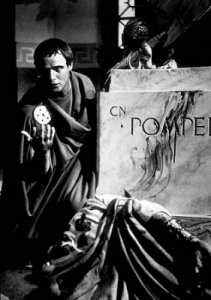Et retorisk mesterstykke

I dagens tidligere indlæg besværede jeg mig over den nyeste teori om, hvem der i virkeligheden var Shakespeare i stedet for Shakespeare, og det slår mig: I stedet for at udtale mig om noget, jeg strengt taget ikke kan vide (måske har the anti-Stratfordians ret denne gang - omend det så skulle være den første), og hvis Shakespeare åbenbart er så vigtig for mig, hvorfor skriver jeg så ikke i stedet noget om, hvorfor han er så vigtig, f.eks. ved at fremhæve et af hans værker?
Jo, men det er jo næsten en umulig opgave - så mange mesterværker, så mange centrale passager, så mange dybe indsigter i, hvad der er godt og stærkt og uhyggeligt og nådesløst tragisk ved menneskelivet.
Men ... på en politisk blog kunne vi måske tage udgangspunkt i det politiske og se på et stykke politisk retorik, nemlig Mark Antony's tale over Julius Cæsars lig (har man ikke tålmodighed til at læse stykket på originalsproget, er filmatiseringen fra 1953 med Marlon Brando som Antony ikke det dårligste sted at starte).
Efter mordet på Cæsar spørger Antony, om han må holde gravtalen over sin døde ven, og Brutus giver ham lov, blot han intet ondt siger om morderne:
Mark Antony, here, take you Cæsar’s body. You shall not in your funeral speech blame us, But speak all good you can devise of Cæsar, And say you do ’t by our permission.'Hele folket er nu forsamlet foran Senatet i Rom, og Brutus forklarer til mængdens store tilfredshed, hvorfor han var nødt til at slå Cæsar ihjel - han gjorde det for sin egen og folkets frihed:
Had you rather Cæsar were living, and die all slaves, than that Cæsar were dead, to live all free men? As Cæsar loved me, I weep for him; as he was fortunate, I rejoice at it; as he was valiant, I honour him; but, as he was ambitious, I slew him. There is tears for his love; joy for his fortune; honour for his valour; and death for his ambition.Brutus byder nu Mark Antony velkommen og går selv, idet han befaler folket at vise Cæsars minde den respekt at høre Antony til ende.
Antony begynder nu, hvad der må være en af litteraturens mest indtrængende og bemærkelsesværdige retoriske præstationer:
Friends, Romans, countrymen, lend me your ears; I come to bury Cæsar, not to praise him. The evil that men do lives after them, The good is oft interred with their bones; So let it be with Cæsar. The noble Brutus Hath told you Cæsar was ambitious; If it were so, it was a grievous fault, And grievously hath Cæsar answer’d it. Here, under leave of Brutus and the rest,— For Brutus is an honourable man; So are they all, all honourable men,— Come I to speak in Cæsar’s funeral. He was my friend, faithful and just to me: But Brutus says he was ambitious; And Brutus is an honourable man. He hath brought many captives home to Rome, Whose ransoms did the general coffers fill: Did this in Cæsar seem ambitious? When that the poor have cried, Cæsar hath wept; Ambition should be made of sterner stuff: Yet Brutus says he was ambitious; And Brutus is an honourable man. You all did see that on the Lupercal I thrice presented him a kingly crown, Which he did thrice refuse: was this ambition? Yet Brutus says he was ambitious; And, sure, he is an honourable man. I speak not to disprove what Brutus spoke, But here I am to speak what I do know. You all did love him once, not without cause: What cause withholds you then to mourn for him? O judgment! thou art fled to brutish beasts, And men have lost their reason. Bear with me; My heart is in the coffin there with Cæsar, And I must pause till it come back to me.Antony blotter Cæsars lig ("If you have tears, prepare to shed them now"!) og viser folket hans sår, ét for ét, idet han gør opmærksom på, at han jo ikke er en stor taler og derfor hverken vil eller kan rejse nogen til oprør:
Good friends, sweet friends, let me not stir you up To such a sudden flood of mutiny. They that have done this deed are honourable: What private griefs they have, alas! I know not, That made them do it; they are wise and honourable, And will, no doubt, with reasons answer you. I come not, friends, to steal away your hearts: I am no orator, as Brutus is; But, as you know me all, a plain blunt man, That love my friend; and that they know full well That gave me public leave to speak of him. For I have neither wit, nor words, nor worth, Action, nor utterance, nor the power of speech, To stir men’s blood: I only speak right on; I tell you that which you yourselves do know, Show you sweet Cæsar’s wounds, poor poor dumb mouths, And bid them speak for me: but were I Brutus, And Brutus Antony, there were an Antony Would ruffle up your spirits, and put a tongue In every wound of Cæsar, that should move The stones of Rome to rise and mutiny.... og det selvsamme folk, som netop var ved at krone Brutus til konge i lutter begejstring, rejser sig til frådende oprør mod Cæsars mordere ...
og ikke et øje er tørt blandt publikum. Se, dét er litteratur. They don't really make it like that any more.
